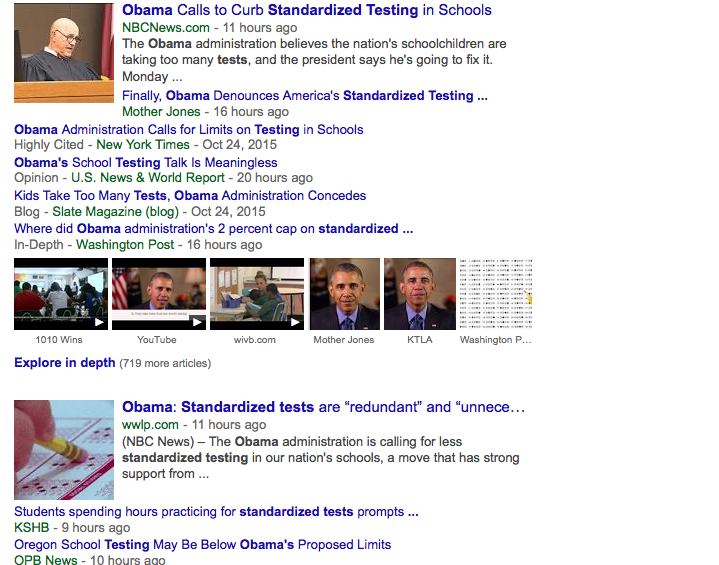[wpfilebase tag=”file” id=810]
There are two NSDA resolution options for the December topic —
Resolved — On balance, standardized testing is beneficial to American education
Resolved — American colleges and universities should stop using SAT/ACT scores as part of their college admissions processes
A few observations about the resolutions.
The second resolution is a subset of the first. SAT/ACT testing is “standardized” testing and therefore could be debated as a case (assuming specific cases are debated in your area) under the first resolution.
There are a number of different cases under the first resolution. Debaters can argue about all of the following tests – Common Core, SAT, ACT, NCLB, and many other state level tests. The phrase, “on balance,” may limit specific case ground, but there is certainly a lot of specific debate to be had.
The first resolution is not written that well. I think what the framers were trying to capture is the debate over “too much” testing, which is what the literature is about. Focusing the debate on “too much” would be hard to word, but this first resolution, I think, allows the Pro to really side-step that question and simply argue that, on balance, it standardized testing plays a beneficial role in education. Even strong advocates of reducing testing argue that standardized testing plays an important role in American education. There are four cards below that make this argument.
The topic is very current, and the first resolution is particularly current. Just a few days ago the Obama administration came out and said the number of standardized tests should be reduced. As just stated, this may beg the question a bit, but it is producing a lot of articles on the value of standardized testing.

Quick release. I have a basic release here that highlights some of the major Pro and Con arguments on each side of the topic.
[wpfilebase tag=”file” id=810]
Should reduce, not eliminate, standardized tests
Quinn Mulholland, May 14, 2015, Harvard Politics, The Case Against Standardized Testing, https://harvardpolitics.com/united-states/case-standardized-testing/, DOA: 10-25-15
This is not to say that America’s accountability system should be completely dismantled. Politicians and schools can de-emphasize testing while still ensuring high achievement. Student and teacher evaluations can take multiple measures of performance into account. The amount of standardized tests students have to take can be drastically reduced. The fewer standardized tests that students do take can incorporate more open-ended questions that force students to think critically and outside the box.
Standardize testing should be reasonable
Randi Weingarten , President, American Federation of Teachers , July 2013, Testing More, Teaching Less: What America’s Obsession with Student Tests Costs in Money and Loss Instructional Time,” https://www.aft.org/sites/default/files/news/testingmore2013.pdf DOA: 10-25-15
Educators know the necessity of gauging student learning—they use various assessment techniques throughout the school day. And we support the proper use of standardized testing and sensible accountability measures. Educators, parents and others have joined AFT’s efforts to restore the balance between teaching and testing, most recently through our “Learning is More than a Test Score” campaign.
The Center for American Progress supports testing, just appropriate use
Melissa Lazarin, October 2014, Center for American Progress, https://cdn.americanprogress.org/wp-content/uploads/2014/10/LazarinOvertestingReport.pdf DOA: 10-26-15
Used properly, high-quality assessments can be a valuable tool for teachers to determine where students are struggling, for parents to understand their children’s progress and knowledge gaps, and for policymakers and advocates who need assurance that all students are receiving a high-quality education. We simply need to get smarter about when, where and how we use them.
CAP agrees tests are good when used properly
Melissa Lazarin, October 2014, Center for American Progress, https://cdn.americanprogress.org/wp-content/uploads/2014/10/LazarinOvertestingReport.pdf DOA: 10-26-15
Used properly, tests are invaluable tools for teachers who want to augment their practice to reach struggling students, for parents who want to understand how their children are doing in reading and math, and for equity advocates who need assurance that all students are receiving a high-quality education. We simply need to get smarter about how and when we use them.
American Federation of Teachers (AFT) supports reasonable testing
Randi Weingarten , President, American Federation of Teachers , July 2013, Testing More, Teaching Less: What America’s Obsession with Student Tests Costs in Money and Loss Instructional Time,” https://www.aft.org/sites/default/files/news/testingmore2013.pdf DOA: 10-25-15
Last summer, delegates to the AFT convention went on record in support of testing that informs, rather than impedes, teaching and learning, and in favor of studies that shed light on the real costs of testing. Testing More, Teaching Less is part of delivering on our commitment to provide guidelines, studies and other helpful information to our members and the broader public about the nature, amount and costs of student assessments. Many other stakeholders have voiced their concerns about the impact of standardized tests and have taken action to curtail overtesting and its consequences. In Texas, lawmakers cut the number of high school end-of-course exams required for graduation from 15 to five, and eliminated the requirement that results would count for 15 percent of a student’s overall grade. The Orchard Park Central School District Board of Education in New York took a stand with a resolution proposing that this year’s state assessments be used for “measuring the state’s progress in introducing the Common Core Learning Standards rather than for measuring student performance or educator effectiveness.” Lawmakers in New Mexico called for an analysis of the cost, both in instructional time and money, of all student assessments. And just this month, the New York Times ended a strongly worded editorial about the dangers of “testing mania” with a call for the country to “reconsider its obsession with testing, which can make education worse, not better.”

